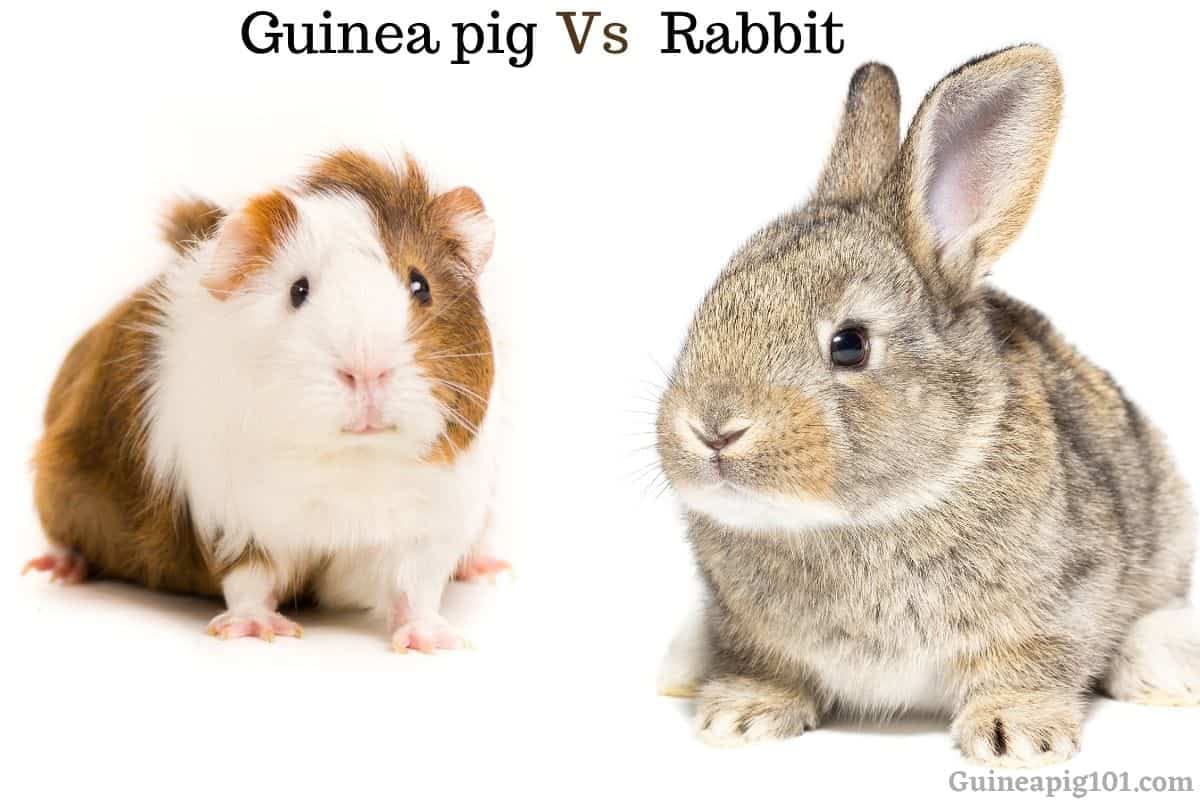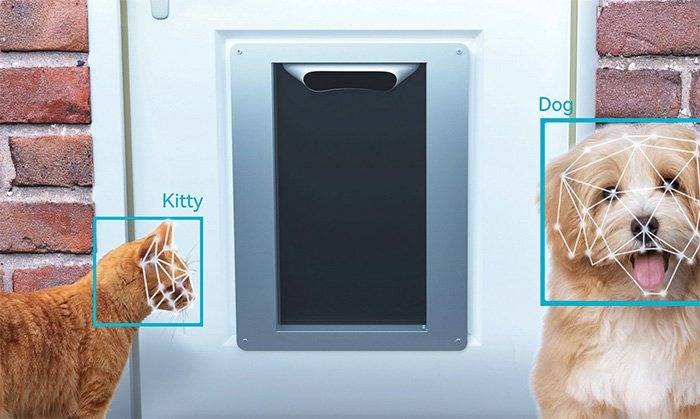
Guinea Pigs vs. Rabbits: Which Pet Is Right for You?
Guinea pigs and rabbits are both popular pets, but they have different needs and personalities. This article compares the two, highlighting their differences in care, personality, diet, space requirements, and general behavior. Whether you're looking for a low-maintenance companion or an active pet, understanding these distinctions can help you choose the right one for your lifestyle.
🐶 Pet Star
21 min read · 22, Jan 2025

1. Physical Differences
Guinea pigs and rabbits vary significantly in size and appearance, which also affects their care needs.
- Size: Rabbits tend to be larger than guinea pigs, with adult rabbits ranging from 2 to 14 pounds, depending on the breed. In contrast, guinea pigs typically weigh between 1.5 to 2.5 pounds, making them more manageable for people with limited space.
- Appearance: Rabbits have long ears and a slender body, while guinea pigs have short, round bodies and a shorter face. Their fur also differs, with rabbits often having longer, fluffier fur compared to guinea pigs, which can have both short and long coats.
2. Space Requirements
The amount of space required for these animals will depend largely on the breed and whether they are kept indoors or outdoors.
- Guinea Pigs: Guinea pigs thrive in spacious enclosures with plenty of room to roam and explore. Ideally, they need at least 7.5 square feet of space per guinea pig in a cage. They do best with solid flooring rather than wire mesh, which can hurt their feet. Additionally, guinea pigs enjoy floor time outside their cages, so a safe, enclosed area is essential.
- Rabbits: Rabbits require significantly larger spaces, especially if they are kept indoors. A rabbit's cage should be at least 12 square feet, and they need daily time outside the cage to hop and exercise. They can be trained to roam around your house if the environment is bunny-proofed, which means ensuring they cannot chew on electrical cords or eat dangerous plants.
3. Diet and Nutrition
Both guinea pigs and rabbits are herbivores, but they have different nutritional requirements.
- Guinea Pigs: Guinea pigs have a specific need for Vitamin C, which they cannot produce on their own. Therefore, their diet should include fresh vegetables such as bell peppers, leafy greens, and hay. Hay should form the base of their diet, and guinea pigs also need fresh water every day. Unlike rabbits, guinea pigs cannot eat pellets formulated for rabbits.
- Rabbits: Rabbits also need a diet rich in hay, but their diet is less reliant on fresh vegetables than guinea pigs. While they enjoy leafy greens and some fruits, hay should make up the majority of their intake. Unlike guinea pigs, rabbits do not need extra Vitamin C, as they can produce it from their diet. Fresh water is just as important for rabbits as it is for guinea pigs.
4. Socialization and Behavior
Understanding the social needs and behavior of these pets is crucial for their well-being.
- Guinea Pigs: Guinea pigs are social animals and prefer to live in pairs or small groups. They are gentle and generally get along well with other guinea pigs, especially if introduced early. While guinea pigs may not be as interactive as rabbits, they enjoy the company of their owners and are relatively easy to handle.
- Rabbits: Rabbits are also social but can be more independent than guinea pigs. They form strong bonds with their human families and other rabbits but require time and patience to establish trust. Rabbits can be trained to perform tricks or use a litter box, but they are also more likely to express their displeasure by chewing or digging.
5. Grooming and Maintenance
Both pets require grooming, but the level of maintenance differs.
- Guinea Pigs: Guinea pigs are generally low-maintenance when it comes to grooming, especially those with short hair. However, long-haired breeds need more frequent brushing to prevent mats and tangles. Guinea pigs do not require regular baths but should be groomed to ensure they don’t develop any skin problems.
- Rabbits: Rabbits need more grooming, particularly the long-haired varieties, which require daily brushing. Regular grooming helps prevent matting and reduces shedding. Additionally, rabbits need their nails trimmed regularly and their teeth checked to ensure they don’t become overgrown, which can cause health issues.
6. Lifespan and Health Care
Guinea pigs and rabbits have different lifespans, which may affect your decision if you’re looking for a long-term commitment.
- Guinea Pigs: Guinea pigs typically live for 4 to 6 years, though some can live up to 8 years with proper care. They are relatively healthy but are prone to certain conditions, such as respiratory infections, dental problems, and bladder stones. Regular vet visits are crucial for maintaining their health.
- Rabbits: Rabbits have a longer lifespan, living 8 to 12 years on average, though some can reach 15 years or more. Like guinea pigs, they are susceptible to health issues, including dental problems, obesity, and digestive disorders. Regular check-ups and preventive care are essential to keeping your rabbit healthy.
7. Handling and Interaction
The way these pets interact with their owners and their tolerance for handling can impact your decision.
- Guinea Pigs: Guinea pigs are generally easy to handle and enjoy being held or sitting on your lap, but they may not tolerate excessive handling. They prefer to be gently lifted and may be startled by sudden movements. Guinea pigs are ideal for families with children as they are less likely to bite.
- Rabbits: Rabbits are more delicate and require more careful handling. While they can be very affectionate, they often prefer not to be held for long periods. Rabbits can become stressed or frightened if mishandled, and they may kick or bite if they feel threatened.
8. Cost of Care
The costs involved in caring for guinea pigs and rabbits are relatively similar, but certain factors can make one more expensive than the other.
- Guinea Pigs: Guinea pigs have low initial costs, but over time, their supplies, including bedding, hay, and fresh vegetables, can add up. They also need regular vet check-ups, which can contribute to ongoing expenses.
- Rabbits: While the initial cost of owning a rabbit can be higher due to the need for larger cages and more supplies, they generally have similar ongoing costs to guinea pigs. However, rabbits are often more prone to health issues that require more frequent veterinary visits, so the cost of care can be higher in the long term.
Q1: Do guinea pigs and rabbits get along with each other?
Ans) Guinea pigs and rabbits can sometimes get along, but it's essential to monitor their interactions. Rabbits can be territorial and may accidentally hurt a guinea pig with their stronger and larger body. If they are to be housed together, it’s best to introduce them gradually under supervision.
Q2: Can I leave my guinea pig or rabbit alone for long periods?
Ans) Both guinea pigs and rabbits should not be left alone for extended periods. They require daily social interaction and care. While guinea pigs can tolerate a bit of alone time, rabbits are more likely to become stressed or destructive if left alone for too long.
Q3: Which pet is easier to train?
Ans) Rabbits are generally more trainable than guinea pigs. They can learn tricks, use a litter box, and even come when called. Guinea pigs, while affectionate, do not respond to training in the same way.
Q4: Are guinea pigs or rabbits better pets for children?
Ans) Guinea pigs are often considered better pets for young children due to their calm nature and ease of handling. Rabbits can be a bit more challenging, especially for younger children, because they require more delicate care and can get stressed more easily.
Q5: Which pet requires less grooming, a guinea pig or a rabbit?
Ans) Guinea pigs generally require less grooming than rabbits, especially if they have short hair. Long-haired guinea pigs do need more frequent brushing, but overall, they are easier to maintain. Rabbits, particularly those with long fur, require daily grooming to prevent matting and shedding, and their nails and teeth need regular attention as well.
Similar Articles
Find more relatable content in similar Articles

How Climate Change Affects Wild and Domestic Animals...
Climate change is dramatically.. Read More

Smart Homes for Pets: Automated Feeders, Doors, and Mo..
As smart home technology advan.. Read More

Sustainable Pet Products: What to Look for in 2025...
As sustainability becomes a ce.. Read More

How Pets Strengthen Family Bonds...
Pets are more than just compan.. Read More
Explore Other Categories
© 2024 Copyrights by rPets. All Rights Reserved.